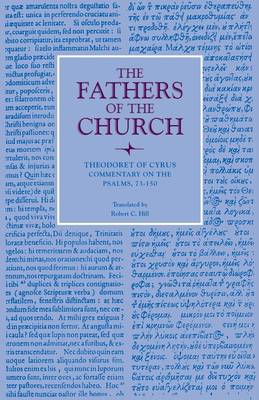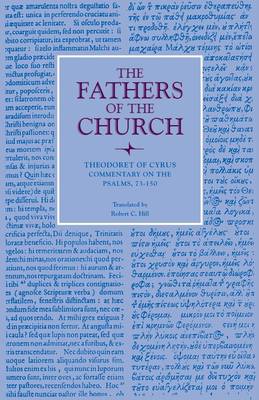
- Afhalen na 1 uur in een winkel met voorraad
- Gratis thuislevering in België vanaf € 30
- Ruim aanbod met 7 miljoen producten
- Afhalen na 1 uur in een winkel met voorraad
- Gratis thuislevering in België vanaf € 30
- Ruim aanbod met 7 miljoen producten
Zoeken
€ 72,95
+ 145 punten
Uitvoering
Omschrijving
This volume completes the Commentary on all the Psalms written by Theodoret, bishop of Cyrus, in the decade before the Council of Chalcedon held in 451, ""a triumph of Antiochene theology,"" in the words of J. N. D. Kelly. The work thus bears the marks of the theological currents of those years, especially as Theodoret was instrumental in convening that Council and was involved in the Christological and trinitarian debates of the period. Theodoret's work of commentary offers readers a great spiritual classic that has contributed to Christian spiritual formation and received the attention of eminent commentators from Antioch and Alexandria in the East, and from the likes of Augustine of Hippo in the West. As this volume closes, Theodoret claims modestly to have offered his readers the best of his predecessors' work (including Alexandrian commentators) together with his own insights into ""the Spirit's hidden mysteries."" He writes as a teacher, not a preacher in his pulpit, with the purpose simply of dispelling ignorance, concerned that ""those singing [the Psalter] daily and uttering the words by mouth do not enquire about the force of the ideas underlying the words."" his translation respects the conciseness which the bishop sets as one aim for himself, his other principle being to let the text speak for itself. Theodoret emerges in this work as a measured commentator and balanced exponent of his school's hermeneutical and theological principles.
Specificaties
Betrokkenen
- Auteur(s):
- Vertaler(s):
- Uitgeverij:
Inhoud
- Aantal bladzijden:
- 396
- Taal:
- Engels
- Reeks:
Eigenschappen
- Productcode (EAN):
- 9780813228303
- Verschijningsdatum:
- 1/02/2001
- Uitvoering:
- Paperback
- Formaat:
- Trade paperback (VS)
- Afmetingen:
- 140 mm x 216 mm
- Gewicht:
- 498 g

Alleen bij Standaard Boekhandel
+ 145 punten op je klantenkaart van Standaard Boekhandel
Beoordelingen
We publiceren alleen reviews die voldoen aan de voorwaarden voor reviews. Bekijk onze voorwaarden voor reviews.











